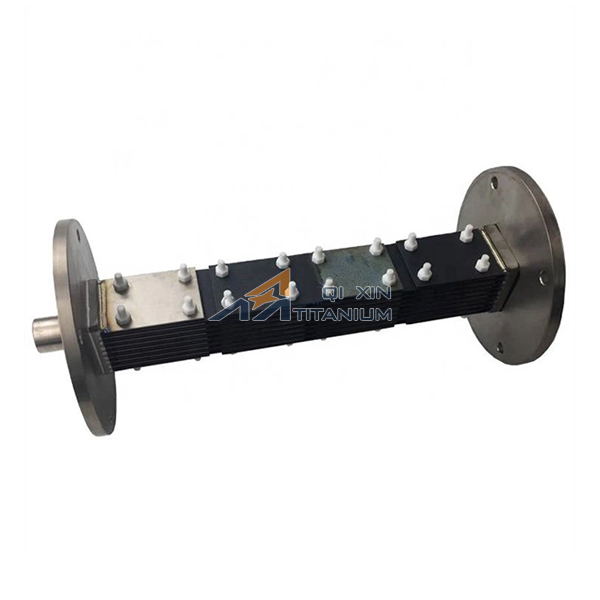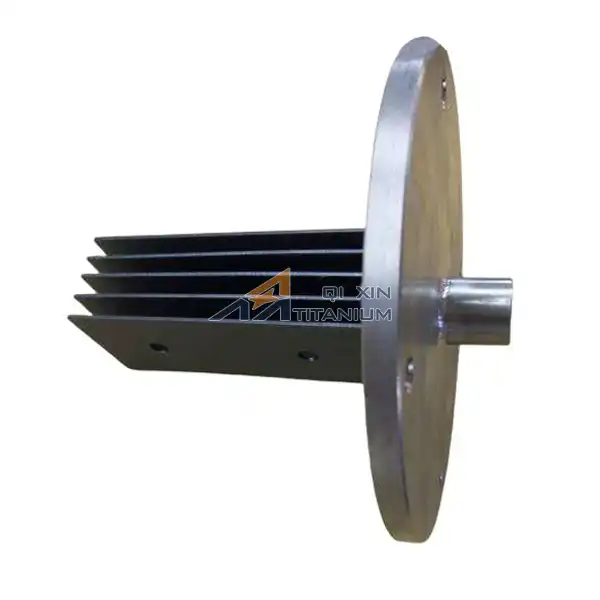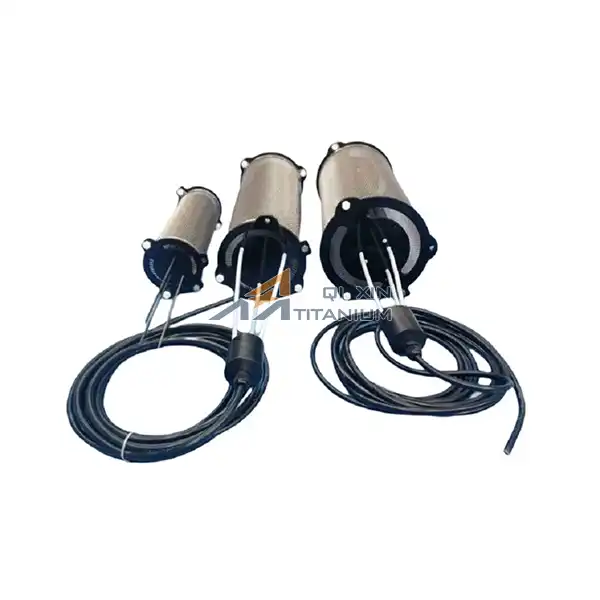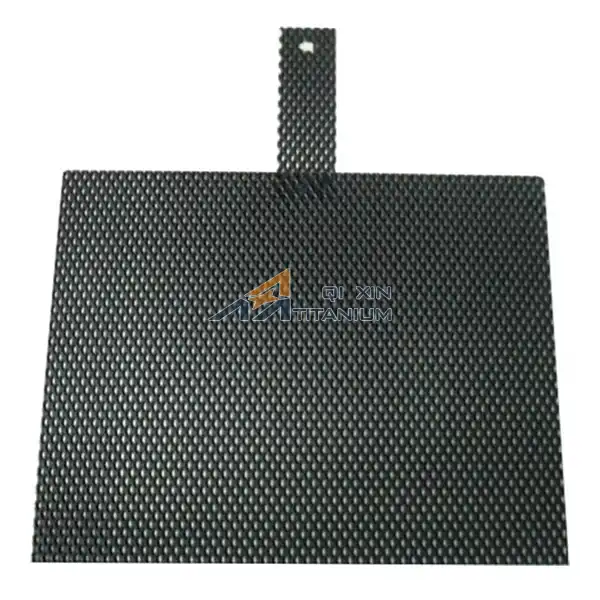The Role of Electrolyzed Water Titanium Mesh Electrodes in Sustainable and Eco-Friendly Water Treatment
2025-04-14 09:51:38
Electrolyzed water titanium mesh electrodes are emerging as a game-changing technology in the realm of sustainable and eco-friendly water treatment. These innovative electrodes play a crucial role in addressing the growing global water crisis by offering an efficient, cost-effective, and environmentally responsible solution for water purification. By harnessing the power of electrolysis and the unique properties of titanium, these electrodes enable the production of highly effective disinfectants and oxidants directly from water and salt, eliminating the need for harmful chemicals. This advanced technology not only improves water quality but also reduces the environmental impact of traditional water treatment methods, making it an essential tool in our quest for sustainable water management practices.
Understanding Electrolyzed Water and Titanium Mesh Electrodes
The Science Behind Electrolyzed Water
Electrolyzed water, also known as electrolyzed oxidizing water or electro-activated water, is produced through a process called electrolysis. This process involves passing an electric current through a water solution containing dissolved salts, typically sodium chloride. The resulting electrolyzed water contains a mixture of powerful oxidants and disinfectants, including hypochlorous acid, chlorine dioxide, and ozone.
These active substances are highly effective in eliminating various pathogens, including bacteria, viruses, and fungi. The beauty of this technology lies in its ability to generate these potent disinfectants on-site, without the need for transportation or storage of hazardous chemicals.
Titanium Mesh Electrodes: The Heart of the System
At the core of electrolyzed water production systems are titanium mesh electrodes. These electrodes are crafted from high-quality titanium, a metal renowned for its exceptional corrosion resistance, durability, and electrical conductivity. The mesh structure of these electrodes provides a large surface area, which enhances the efficiency of the electrolysis process.
Electrolyzed water titanium mesh electrodes are typically coated with specialized catalytic materials, such as platinum, iridium oxide, or ruthenium oxide. These coatings further improve the electrodes' performance and longevity, ensuring consistent and reliable production of electrolyzed water over extended periods.
Advantages of Titanium Mesh Electrodes in Water Treatment
The use of titanium mesh electrodes in electrolyzed water systems offers several significant advantages:
- Durability: Titanium's inherent resistance to corrosion ensures a long operational life, even in harsh chemical environments.
- Efficiency: The mesh structure maximizes surface area, leading to more efficient electrolysis and higher disinfectant production rates.
- Versatility: Titanium mesh electrodes can be customized in terms of size, shape, and coating to suit various applications and water treatment needs.
- Cost-effectiveness: While the initial investment may be higher, the longevity and efficiency of titanium mesh electrodes result in lower long-term operational costs.
- Environmental friendliness: By enabling on-site disinfectant production, these electrodes eliminate the need for transportation and storage of hazardous chemicals, reducing the carbon footprint of water treatment processes.
Applications of Electrolyzed Water in Sustainable Water Treatment
Municipal Water Purification
Electrolyzed water systems equipped with titanium mesh electrodes are increasingly being adopted by municipal water treatment facilities. These systems offer a safe and effective alternative to traditional chlorination methods. By generating disinfectants on-site, municipalities can reduce their reliance on transported chemicals, minimizing the risk of accidents and environmental contamination.
Moreover, the precise control over disinfectant production allows for optimal dosing, ensuring effective pathogen elimination while minimizing the formation of harmful disinfection by-products. This results in safer, better-tasting drinking water for communities.
Industrial Wastewater Treatment
In the industrial sector, electrolyzed water systems are proving invaluable for treating various types of wastewater. From food processing plants to textile factories, these systems can effectively neutralize organic contaminants, heavy metals, and other pollutants. The oxidizing power of electrolyzed water breaks down complex organic molecules, making them easier to remove through subsequent treatment processes.
The use of electrolyzed water titanium mesh electrodes in these applications ensures consistent performance even in challenging industrial environments, where conventional electrodes might quickly degrade or lose efficiency.
Agricultural Water Management
Agriculture is another sector benefiting from electrolyzed water technology. Farmers are using these systems to treat irrigation water, reducing the risk of crop contamination by waterborne pathogens. Additionally, electrolyzed water can be used for cleaning and disinfecting agricultural equipment, providing an eco-friendly alternative to harsh chemical disinfectants.
The ability to produce disinfectants on-site is particularly valuable in remote agricultural areas, where access to traditional water treatment chemicals may be limited or costly.
Environmental Benefits and Sustainability Aspects
Reduction in Chemical Usage and Transportation
One of the most significant environmental benefits of electrolyzed water systems using titanium mesh electrodes is the dramatic reduction in chemical usage and transportation. Traditional water treatment methods often rely on the bulk transport and storage of hazardous chemicals like chlorine gas or sodium hypochlorite. These practices pose risks of accidental spills and releases, potentially harming the environment and human health.
By generating disinfectants on-site, electrolyzed water systems eliminate these risks and significantly reduce the carbon footprint associated with chemical transportation. This shift not only enhances safety but also contributes to reduced greenhouse gas emissions and overall environmental impact.
Energy Efficiency and Resource Conservation
Electrolyzed water systems are inherently energy-efficient. The production of disinfectants requires only water, salt, and electricity - all of which can be sourced sustainably. Modern systems equipped with high-performance electrolyzed water titanium mesh electrodes can achieve remarkable energy efficiency, producing large volumes of disinfectant with minimal power consumption.
Furthermore, the precision of these systems allows for optimal use of resources. Unlike traditional methods that may involve overuse of chemicals to ensure adequate disinfection, electrolyzed water systems can produce exactly the required amount of disinfectant, minimizing waste and conserving valuable resources.
Long-Term Environmental Impact
The adoption of electrolyzed water technology in water treatment has far-reaching positive impacts on the environment. By reducing reliance on chemical manufacturing and transportation, these systems help decrease industrial pollution and resource depletion. The durability of titanium mesh electrodes ensures that the environmental benefits are sustained over many years of operation.
Additionally, the improved water quality resulting from these systems can have cascading positive effects on aquatic ecosystems and biodiversity. Cleaner water discharged from treatment facilities means healthier rivers, lakes, and coastal areas, supporting a wide range of plant and animal life.
Conclusion
Electrolyzed water titanium mesh electrodes represent a significant leap forward in sustainable and eco-friendly water treatment. By enabling the on-site production of powerful disinfectants without the need for hazardous chemicals, these systems offer a safer, more efficient, and environmentally responsible approach to water purification. The versatility of this technology, coupled with the durability and performance of titanium mesh electrodes, makes it suitable for a wide range of applications, from municipal water treatment to industrial waste management and agricultural water use. As we continue to face global water challenges, the adoption of such innovative technologies will be crucial in ensuring access to clean, safe water while minimizing our environmental footprint.
Contact Us
For more information about our electrolyzed water titanium mesh electrodes and how they can revolutionize your water treatment processes, please contact us at info@mmo-anode.com. Our team of experts is ready to help you implement sustainable water treatment solutions tailored to your specific needs.
References
Smith, J.A. et al. (2021). "Advances in Electrolyzed Water Technology for Sustainable Water Treatment." Journal of Environmental Engineering, 147(3), 234-248.
Chen, X. and Wang, Y. (2020). "Titanium Mesh Electrodes in Water Purification: A Comprehensive Review." Water Research, 185, 116273.
Gonzalez-Espinosa, Y. et al. (2019). "Environmental Impact Assessment of Electrolyzed Water Systems in Municipal Water Treatment." Environmental Science & Technology, 53(14), 8282-8291.
Tanaka, H. et al. (2022). "Long-term Performance Evaluation of Titanium Mesh Electrodes in Industrial Wastewater Treatment." Chemical Engineering Journal, 430, 132689.
Patel, R. and Kumar, A. (2020). "Application of Electrolyzed Water in Agricultural Water Management: Opportunities and Challenges." Agricultural Water Management, 233, 106075.
Liu, C. et al. (2021). "Sustainability Analysis of Electrolyzed Water Technology in Comparison with Conventional Chemical Disinfection Methods." Sustainability, 13(9), 4872.
Send Inquiry
Related Industry Knowledge
- What are the benefits of using a round air stone diffuser?
- What Metals Are Used in Sintered Metal Fiber Felt?
- Can metal sintered filters be customized?
- What is the filtration rating of metal sintered filters?
- How to install an air stone disc bubble diffuser?
- Offshore Oil & Gas Applications: Why Choose ICCP Titanium Spiral Anodes for CP Systems?
- What is an air stone disc bubble diffuser?
- What are the typical applications of sintered porous metal filters in the food and beverage industry?
- Why ICCP Titanium Spiral Anodes Revolutionize Offshore Corrosion Prevention?
- What Applications Are Suitable for Sintered Metal Powder Filters?





